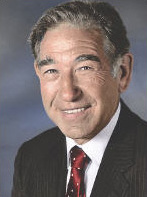Biography:Stanley Cohen (biochemist)
Stanley Cohen | |
|---|---|
 | |
| Born | Brooklyn, New York, U.S. |
| Died | February 5, 2020 (aged 97) Nashville, Tennessee , U.S. |
| Alma mater | University of Michigan Oberlin College Brooklyn College |
| Known for | Nerve growth factor |
| Awards | Rosenstiel Award (1981) Louisa Gross Horwitz Prize (1983) Albert Lasker Award for Basic Medical Research (1986) Nobel Prize in Physiology or Medicine (1986) Franklin Medal (1987) |
| Scientific career | |
| Fields | Biochemistry |
| Institutions | Vanderbilt University (1959–1999) Washington University in St. Louis (1953–1959) |
| Thesis | The Nitrogenous Metabolism of the Earthworm (1949) |
| Doctoral advisor | Howard B. Lewis[1][2] |
Stanley Cohen (November 17, 1922 – February 5, 2020) was an American biochemist who, along with Rita Levi-Montalcini, was awarded the Nobel Prize in Physiology or Medicine in 1986 for the isolation of nerve growth factor and the discovery of epidermal growth factor. He died in February 2020 at the age of 97.[3][4]
Early life and education
Cohen was born in Brooklyn, New York, on November 17, 1922. He was the son of Fannie (née Feitel) and Louis Cohen, a tailor.[5][6] His parents were Jewish immigrants.[7] Cohen received his bachelor's degree in 1943 from Brooklyn College, where he had double-majored in chemistry and biology. After working as a bacteriologist at a milk processing plant to earn money, he received his Master of Arts in zoology from Oberlin College in 1945. He earned a doctorate from the department of biochemistry about the metabolism of earthworms at the University of Michigan in 1948.
Career
His first academic employment was at the University of Colorado studying the metabolism of premature babies. In 1952 he moved to Washington University in St. Louis, working first in the department of radiology, learning isotope methodology, and then in the department of zoology. Working with Rita Levi-Montalcini, he isolated nerve growth factor. He later isolated a protein that could accelerate incisor eruption and eyelid opening in newborn mice,[8] which was renamed epidermal growth factor.[9] He continued research on cellular growth factors after joining the faculty of Vanderbilt University School of Medicine in 1959.
In 1999, Cohen retired from Vanderbilt University.[10]
Awards and legacy
Cohen received the Louisa Gross Horwitz Prize from Columbia University together with Rita Levi-Montalcini in 1983, the Nobel Prize in Physiology or Medicine in 1986 for the isolation of nerve growth factor and the discovery of epidermal growth factor and the National Medal of Science in 1986.[11][12][13][14] His research on cellular growth factors has proven fundamental to understanding the development of cancer and designing anti-cancer drugs.
His Scopus h-index value was 82 as of March 2022.[15]
See also
- List of Jewish Nobel laureates
References
- ↑ Cohen, S.; Lewis, H. B. (1949). "The nitrogenous metabolism of the earthworm (Lumbricus terrestris)". The Journal of Biological Chemistry 180 (1): 79–91. doi:10.1016/S0021-9258(18)56725-9. PMID 18133376.
- ↑ Cohen, S.; Lewis, H. B. (1950). "The nitrogenous metabolism of the earthworm (Lumbricus terrestric). II. Arginase and urea synthesis". The Journal of Biological Chemistry 184 (2): 479–484. doi:10.1016/S0021-9258(19)50977-2. PMID 15428427.
- ↑ "Biochemist and Nobel Prize winner Stanley Cohen dies in Nashville at age 97". https://eu.tennessean.com/story/news/local/2020/02/05/stanley-cohen-biochemist-nobel-prize-winner-dies/4669415002/.
- ↑ Glaser, Vicki (7 February 2020). "Stanley Cohen, Nobelist, Dies at 97; Made Breakthrough on Cell Growth". The New York Times. https://www.nytimes.com/2020/02/07/science/stanley-cohen-dead.html.
- ↑ Stanley Cohen Biography. http://www.bookrags.com/biography/stanley-cohen-woh/. Retrieved 6 May 2018.
- ↑ The international who's who 2004. (67th ed.). London: Europa. 2003. p. 339. ISBN 978-1857432176. https://books.google.com/books?id=sR4Ch1dMe8IC&pg=PA339. Retrieved 4 May 2016.
- ↑ Fox, Daniel M.; Meldrum, Marcia; Rezak, Ira (2019-01-15). Nobel Laureates in Medicine or Physiology: A Biographical Dictionary. Routledge. ISBN 9780429665035. https://books.google.com/books?id=x6l-DwAAQBAJ&q=%22Feitel+Cohen,+were+Jewish+immigrants;+his+father%22&pg=PT118.
- ↑ Watts, Geoff (March 2020). "Stanley Cohen" (in en). The Lancet 395 (10227): 864. doi:10.1016/S0140-6736(20)30550-X.
- ↑ Carpenter, G.; Cohen, S. (1979). "Epidermal Growth Factor". Annual Review of Biochemistry 48: 193–216. doi:10.1146/annurev.bi.48.070179.001205. PMID 382984.
- ↑ "Cohen's visit brings alive wonder, power of science (12/7/07)". https://www.mc.vanderbilt.edu/reporter/index.html?ID=6020.
- ↑ Cohen, Stanley (1993). "Epidermal Growth Factor". in Tore Frängsmyr. Nobel Lectures, Physiology or Medicine 1981–1990. Singapore: World Scientific Publishing Co. ISBN 978-981-02-0793-9. http://nobelprize.org/nobel_prizes/medicine/laureates/1986/cohen-lecture.pdf. Cohen's Nobel Lecture.
- ↑ Raju, T. N. (2000). "The Nobel chronicles. 1986: Stanley Cohen Cohen (b 1922); Rita Levi-Montalcini (b 1909)". Lancet 355 (9202): 506. doi:10.1016/S0140-6736(00)82069-3. PMID 10841166.
- ↑ Shampo, M. A.; Kyle, R. A. (1999). "Stanley Cohen—Nobel Laureate for Growth Factor". Mayo Clinic Proceedings 74 (6): 600. doi:10.4065/74.6.600. PMID 10377936.
- ↑ Weltman, J. K. (1987). "The 1986 Nobel Prize for Physiology or Medicine awarded for discovery of growth factors: Rita Levi-Montalcini, M.D., and Stanley Cohen, Ph.D". New England and Regional Allergy Proceedings 8 (1): 47–48. doi:10.2500/108854187779045385. PMID 3302667.
- ↑ "Cohen, Stanley N.". https://www.scopus.com/authid/detail.uri?authorId=35476774500.
External links
- Miss nobel-id as parameter including the Nobel Lecture 8 December 1986 Epidermal Growth Factor
- Stanley Cohen Nobel link
- The Official Site of Louisa Gross Horwitz Prize
 |


